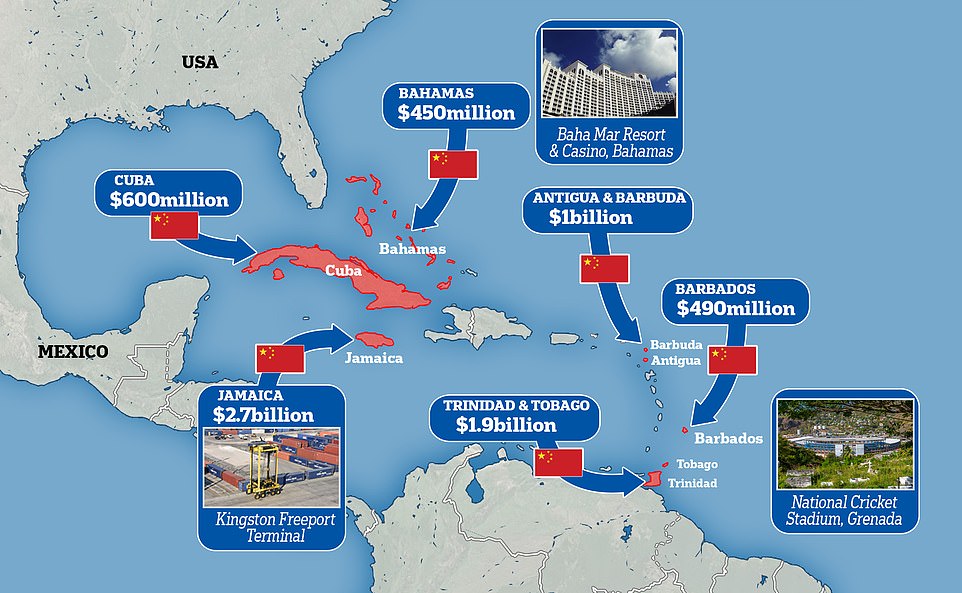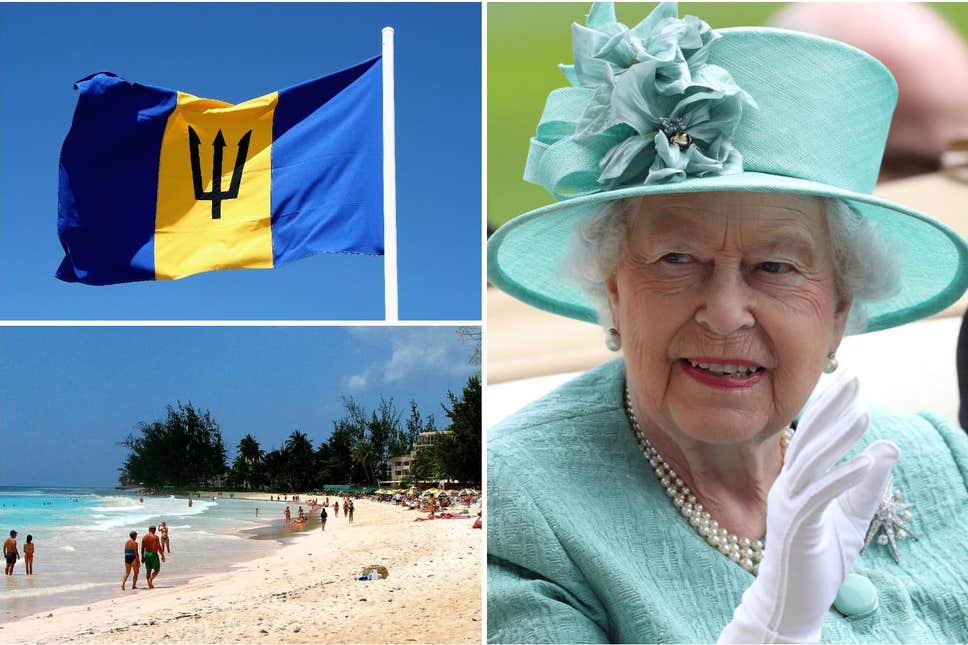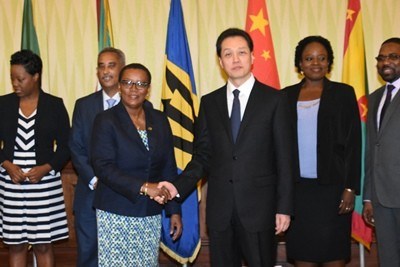BRIDGETOWN — China is behind Barbados’ snap decision to remove the British Queen as its head of state.
That’s the shocking claim of a conservative member of the UK Parliament who said that a Chinese investment of $490 million in Bridgetown’s tourism infrastructure forced the Barbadian leader’s hand in the matter this month.
“Some islands seem to be close to swapping a symbolic Queen in Windsor for a real and demanding emperor in Beijing,” Tom Tugendhat, chairman of the UK’s Foreign Affairs Committee, said. “It’s interesting because of course the UK is really not a monarchy, we’re a republic pretending to be a monarchy. The Crown in Parliament after all is simply a recognition that the people are sovereign.”
Tugendhat said Beijing is attempting to replace London’s historical status and presence in the Caribbean with a $600 million loan to Cuba, a $1 billion loan to Antigua and Barbuda, a $1.9 billion loan to Trinidad & Tobago, a $450 million loan to the Bahamas and a $2.7 billion loan for Jamaica.

“China has been using infrastructure investment and debt diplomacy as a means of control for a while and it’s coming closer to home for us,” he told The London Times.
Meanwhile, CIA intelligence in the U.S. about Chinese activities in Barbados has now reportedly been shared with Britain.
China has poured billions of dollars of investment into the Caribbean in recent years while signing tax and trade deals in an attempt to wrest the region out of the West’s sphere of influence and bring it under the sway of Beijing.
The Chinese government has invested at least $7 billion in six Caribbean nations since 2005, records complied by the American Enterprise Institute show — building roads, ports and the five-star Baha Mar casino and resort in the Bahamas — though the true figure is thought to run well into the tens of billions.
While some of the money arrives as part of trade and investment deals, much of it is offered as “soft loans” for infrastructure projects that are harder to track and typically come with requirements to use Chinese contractors for the work. The loans also provide long-term leverage for Beijing over the cash-strapped island nations.
Some eight countries in the region have signed on to Beijing’s Belt and Road initiative, kind of a 21st Century maritime version of the Silk Road, which includes: Jamaica, Barbados and Trinidad and Tobago.
In the past, China has been particularly generous with nations that have agreed to cut relations with Taiwan — a country in the East China Sea which Beijing claims as a province — and establish ties with Bejing instead.
In 2005, China rewarded the island of Grenada, which has an annual GDP of just $1.8 billion, with a brand new $55 million cricket stadium after it cut relations with Taiwan.
Similarly, in 2018, the Dominican Republic received Chinese investments and loans thought to have exceeded $3 billion after it also cut ties with Taipei.
Beijing has largely moved away from vote-buying projects in recent years, however, and now largely focuses on economic deals aimed at providing work for its citizens, acquiring resources such as rare earth materials and food, and providing long-term trading and economic benefits.
In 2018, leaders from the region and South America – as part of a trading bloc known as CELAC — signed up to a 2019-2021 roadmap with China that aimed to deepen political and economic ties, including in trade, agriculture, infrastructure and science and technology, among other areas.
More recently, a Chinese firm took full control of Jamaica Kingston Freeport in April this year, the island’s largest container port and one of the largest in the Caribbean.
China has also invested heavily in Cuba, helping to modernize the country’s second-largest port — Santiago de Cuba — with a new shipping terminal opening in 2019.
Barbados, meanwhile, has received at least $490 million, mostly as investment in the tourism sector, but is also thought to be benefiting from private deals.
On a four-nation swing through South America, U.S. Secretary of State Mike Pompeo said that the United States was wary of the Chinese encroachment in the Caribbean and Latin America.
“China operates very differently,” Pompeo said. “No state-owned operation can beat the quality of the products and services of American private companies. We’ve watched the Chinese Communist Party invest in countries, and it all seems great at the front end and then it all comes falling down when the political costs connected to that become clear.”
“We’ll show up, we’ll bring capital, we’ll bring resources. We’ll often bring technological capabilities that are much needed to develop resources, develop infrastructure for your country, but we don’t do so with political strings tied to them. We don’t operate the way other regimes do, who might show up with money and then demand political retribution, or worse yet, engage in activity that is corrupt.”
China/UK relations
Tugendhat shared his concerns during a digitally streamed webinar in collaboration with the Royal United Services Institute.
His speech, titled “Reappraising UK foreign policy towards China,” discussed the risks China poses to the Caribbean.
“British partners have long faced challenges from rivals seeking to undermine our alliance,” he said in the webinar.
But not all Caribbean voices agreed with Tugendhat. Ronald Sanders, ambassador of Antigua and Barbuda to the United States and the Organization of American States, was one of them.

“As head of the Foreign Affairs Committee, Tugendhat should have been better informed,” Sanders wrote in an OP/ED piece on Thursday. “The Barbados government was no more influenced by China to change its status to a Republic, than it was under pressure by the British government to continue to share Queen Elizabeth as the Head of the two separate realms.”
“It is unfortunate that some in the international community regard small states as inexpert, seeing them as ready objects of manipulation by big powers through either coercion or enticements. Thus, the presence of China in the Caribbean, where it has made investments that have aided economic development, is characterized as ‘a means of control’, as Tugendhat puts it.”
“Discounted altogether is that, in many Caribbean countries, China has given much-needed loans and grants when others have been significant by their absence, or where, by their presence, they institute unhelpful policies of ‘blacklisting’ countries without consultation, or blocking much-needed loans from international financial institutions on criteria that takes no account of the vulnerability of small states.”
“Do loans translate into coercive influence over small Caribbean states? The answer is unreservedly no. Loans must be repaid, including Chinese ones whose main attraction is their longer repayment periods and lower interest rates. If their rivals met their terms, competition would win out.”
The Chinese controversy comes just eight days after Barbados’ governor-general, Dame Sandra Mason, announced the island will no longer honor the Queen as its symbolic head, saying: “The time has come to fully leave our colonial past behind.”
Barbados gained independence in 1966.
There has been three attempts to remove the Queen in Barbados in the last 20 years.
https://menafn.com/1100854234/Caribbean-wouldnt-tolerate-external-interference-on-Republic-status

